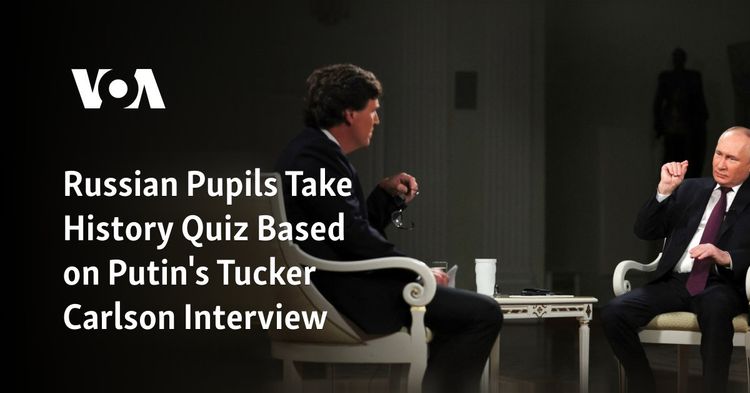Russian Pupils Take History Quiz Based on Putin's Tucker Carlson Interview

Students all over Russia participated in a history quiz this month, which included watching clips of President Vladimir Putin's chat with American reporter Tucker Carlson. Various educational institutions posted about the quiz on social media.
During a two-hour interview in February, Putin started by talking to Carlson for around 30 minutes about the past of Russia dating back to 862. He claimed that Ukraine did not have a history of being an independent state, which Kyiv has denied as being untrue and biased.
On VK, Russian schools characterized the quiz as an "intellectual challenge" that aided kids in comprehending "the growth stages of the Russian nation." The posts proclaimed that it was both enjoyable and informative.
There were situations where kids who were just 6 or 7 years old participated. A school located in the south of Russia in Rostov announced that students ranging from grade one to grade eleven were shown some parts of the interview and completed age-appropriate questionnaires afterward.
The grammar school in Domodedovskaya stated that the children were given an assignment to come up with questions to send to Putin after completing a quiz consisting of 11 rounds. They acknowledged that since it was a countrywide occasion, it is regrettable that not everyone will get responses from the president, but the school remains optimistic.
Reuters tried to get responses from eight school principals and teachers who participated in the event. However, they haven't answered yet.
Ne Norma, a group of volunteers dedicated to monitoring the indoctrination of Russian children with Putin's ideology behind the invasion of Ukraine, initially announced the quiz.
According to Dmitry Tsibiryov, who speaks for the project, it comes as no shock that the Carlson interview is being displayed to kids due to the enormous media attention it has gathered through state propaganda.
The clips that were utilized in the quiz were not specified. Carlson received a lot of negative feedback for not posing challenging questions to the leader of the Kremlin, and Putin himself expressed a desire for more difficult interrogation.
The quiz consisted of various multiple-choice questions aimed at emphasizing Putin's statements. One of the questions required the kids to be aware that "Ukrainian" had a different meaning back in the 13th century where it referred to a person living on a border safeguarding region rather than to an individual residing in a nation called Ukraine.
According to Tsibiryov, the quiz was just a small part of a bigger change in the curriculum that has happened since the war began. The change includes new lessons called "Important Conversations" that focus on patriotism. These lessons sometimes involve soldiers and veterans visiting schools.
Earlier, Ne Norma made known incidents where kids produced stuff like camouflage nets and trench candles meant for dispatching to troops located in Ukraine.
In October of last year, a picture was released of young kids in kindergarten wearing hats that resembled those of soldiers. This photograph was taken in front of a background that displayed a sentence from Alexander Suvorov, a general from the 18th century, which stated that a warrior's look should make the opponent afraid.
Putin has urged the people of Russia to come together during a period in which the country is embroiled in conflict with Ukraine and perceives a significant threat to its existence from Western powers. In 2020, Vladimir Medinsky, who works closely with the Kremlin, released four updated history textbooks aimed at students aged 16-18 that support Putin's perspective on events such as the collapse of the Soviet Union and the reasons for the ongoing conflict in Ukraine.
During a phone conversation, Tsibiryov noted that the educational system is progressively being utilized as a tool for spreading propaganda with the intention of securing fresh recruits and volunteers for war efforts.
According to Tsibiryov, engaging in such activities is completely pointless. He believes that the negative impact they have is promoting a distorted perception of patriotism. This kind of attitude may be instilled in younger generations and may persist over time, influencing their behavior even if they don't directly participate in the war.









































































